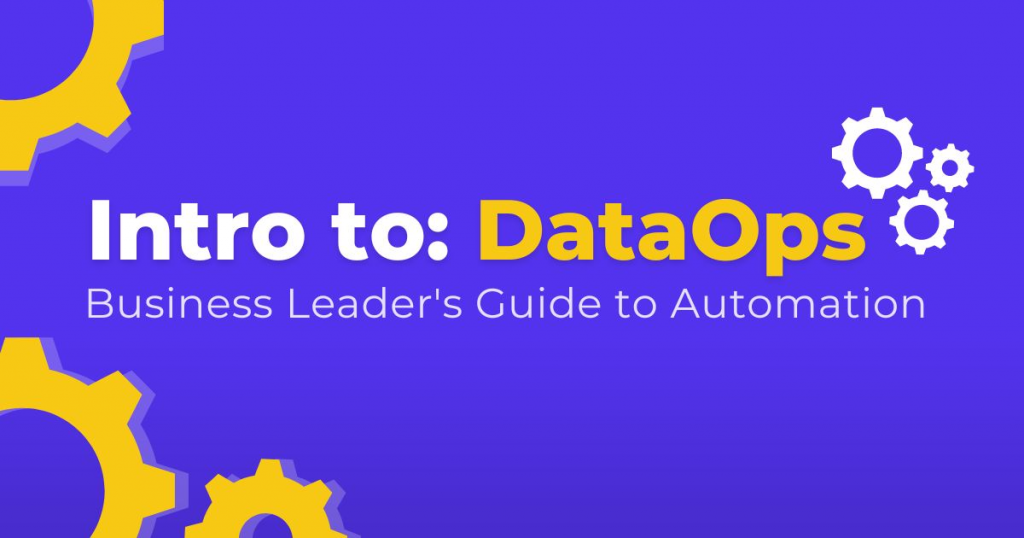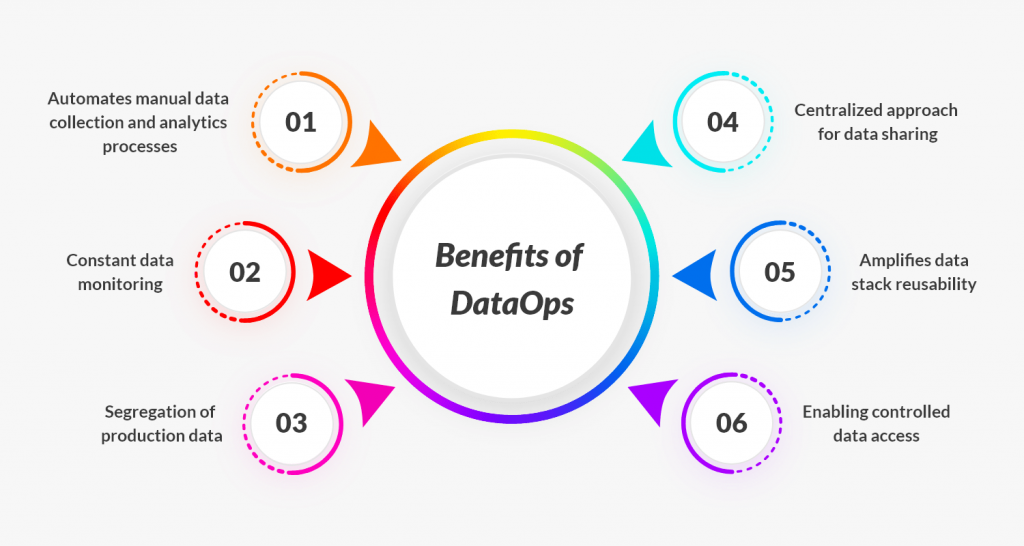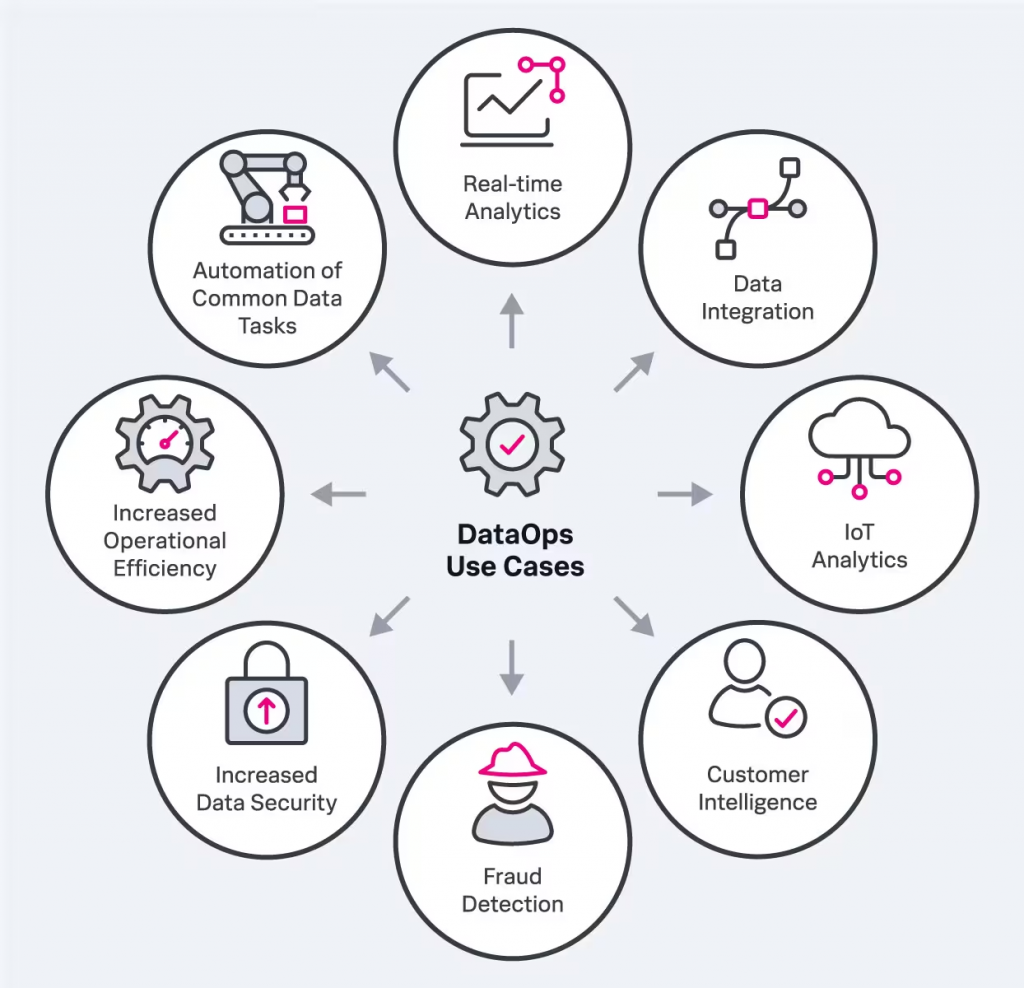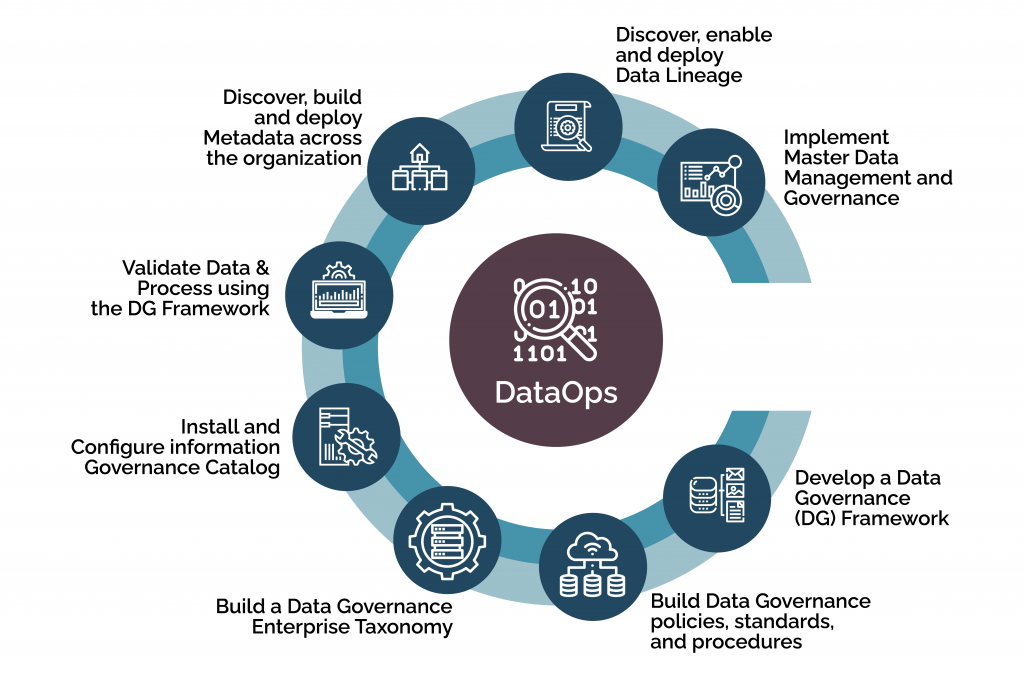
DataOps is a set of practices, principles, and cultural philosophies that aim to improve the collaboration and integration of data engineering, data integration, data quality, and data analytics processes within an organization. Similar to how DevOps focuses on improving collaboration between development and operations teams, DataOps focuses on improving collaboration between data teams and other stakeholders, while also emphasizing automation and continuous delivery of data-related processes.
The primary goals of DataOps are to streamline and automate the end-to-end data lifecycle, ensure high-quality and reliable data, and enable data-driven decision-making in a more efficient and agile manner.
Key Aspects of DataOps:
- Collaboration: DataOps emphasizes collaboration between data engineers, data analysts, data scientists, and other teams involved in the data lifecycle. It also involves collaboration with business stakeholders to understand data requirements and priorities.
- Automation: Similar to DevOps, automation plays a significant role in DataOps. It involves automating data pipelines, data integration, data transformation, and data quality processes to reduce manual efforts and improve efficiency.
- Continuous Integration and Continuous Delivery (CI/CD): DataOps incorporates CI/CD principles into the data workflow, allowing for frequent and automated testing, validation, and deployment of data pipelines and processes.
- Version Control: Like code in software development, DataOps promotes version control for data artifacts such as data models, schemas, and transformations. This secures traceability and allows for simple collaboration among team members.
- Monitoring and Feedback: Continuous monitoring of data pipelines and processes helps identify and address issues early, ensuring data quality and reliability.
- Agile and Iterative Practices: DataOps adopts agile and iterative development practices, allowing for quicker responses to changing data requirements and business needs.
Why Do We Need DataOps?
- Data Quality and Reliability: DataOps focuses on ensuring high-quality and reliable data. By automating testing and validation processes, organizations can identify and rectify data quality issues early, leading to better-informed decision-making.
- Faster Insights: DataOps enables quicker delivery of data pipelines and analytics, allowing organizations to gain insights from data in a timely manner. This speed is crucial for making informed business decisions.
- Efficiency: Automation and standardized processes in DataOps lead to increased efficiency and reduced manual efforts in managing data workflows.
- Collaboration: Improved collaboration between data teams and business stakeholders ensures that data solutions are aligned with business goals and requirements.
- Scalability: DataOps practices make it easier to scale data processes to handle larger datasets and increased workload.
- Adaptation to Change: Like DevOps, DataOps allows organizations to adapt to changing data requirements and market demands more effectively.
- Reduced Risk: By automating testing and validation, DataOps reduces the risk of data errors and inconsistencies that could impact business decisions.
- Innovation: DataOps provides a framework for experimenting with new data sources, technologies, and analytics techniques in a controlled and iterative manner.
- Data Governance: DataOps promotes better data governance practices by ensuring that data processes are well-documented, version-controlled, and traceable.
Overall, DataOps addresses the challenges of managing and delivering high-quality data in a rapidly evolving data landscape. It provides a structured approach to efficiently handle data-related processes, enabling organizations to derive value from their data assets while maintaining data integrity and reliability.
What is the Advantage of DataOps?

- Improved Data Quality: DataOps practices emphasize continuous testing and validation, leading to higher data quality and reduced errors in data pipelines.
- Faster Time to Insights: Automation and streamlined processes in DataOps enable faster delivery of data and analytics, allowing for quicker decision-making.
- Enhanced Collaboration: DataOps fosters collaboration between data teams, business stakeholders, and other departments, ensuring that data solutions align with business goals.
- Efficiency: Automation of data processes reduces manual efforts, leading to increased efficiency in managing and delivering data.
- Scalability: DataOps practices make it easier to scale data pipelines and processes to handle larger volumes of data.
- Agile Adaptation: Similar to agile software development, DataOps allows organizations to adapt to changing data requirements and business needs.
- Reduced Data Errors: Continuous monitoring and automated validation help in identifying and addressing data errors early, minimizing their impact on decision-making.
- Innovation: DataOps provides a framework for experimenting with new data sources, technologies, and analytics approaches, fostering innovation.
- Data Governance: DataOps encourages better data governance practices by ensuring that data processes are well-documented, version-controlled, and traceable.
- Quicker Issue Resolution: Monitoring and feedback mechanisms in DataOps allow for quicker identification and resolution of issues in data pipelines.
What is the feature of DataOps?
- Collaboration: DataOps promotes collaboration between data engineers, data scientists, analysts, and business stakeholders, breaking down silos and enhancing communication.
- Automation: Automation of data integration, transformation, and validation processes ensures consistent and reliable data delivery.
- Continuous Integration and Continuous Delivery (CI/CD): CI/CD principles are applied to data processes, allowing for frequent testing, validation, and deployment of data pipelines.
- Version Control: Like version control for code, DataOps emphasizes version control for data artifacts to maintain traceability and facilitate collaboration.
- Monitoring and Feedback: Continuous monitoring of data pipelines and processes provides feedback on performance and issues, allowing for quick responses.
- Agile Practices: DataOps embraces agile methodologies, enabling iterative development and faster adaptation to changing requirements.
- Data Quality Management: DataOps includes automated data quality checks and validation to ensure accurate and reliable data.
- Data Governance: DataOps practices promote better data governance by documenting processes, maintaining data lineage, and ensuring compliance.
- Flexibility and Scalability: DataOps supports scalability of data processes to handle varying workloads and large volumes of data.
- Adaptation to Change: DataOps allows organizations to efficiently incorporate changes in data requirements and business needs.
- Efficient Deployment: Automated deployment of data pipelines ensures consistency and reliability across different environments.
- Cross-Functional Alignment: DataOps aligns data teams with business goals and requirements, enabling data-driven decision-making.
Overall, DataOps provides a structured approach to managing and delivering data in a more efficient, reliable, and collaborative manner. It addresses the challenges of data quality, agility, and alignment with business objectives, ultimately enabling organizations to derive more value from their data assets.
What is the Top 10 Use cases of DataOps?

Here are the top 10 use cases of DataOps:
- Data quality: DataOps can help to improve data quality by implementing automated data validation and data cleansing techniques.
- Data governance: DataOps can help to improve data governance by ensuring that data is managed in a consistent and secure manner.
- Data integration: DataOps can help to integrate data from different sources into a single, unified view.
- Data analysis: DataOps can help to improve data analysis by providing a more efficient and reliable way to process data.
- Machine learning: DataOps can help to improve machine learning by providing a more efficient and reliable way to train and deploy machine learning models.
- Data visualization: DataOps can help to improve data visualization by providing a more efficient and reliable way to create and share data visualizations.
- Data security: DataOps can help to improve data security by implementing automated security checks and by integrating security into the data lifecycle.
- Compliance: DataOps can help to improve compliance by automating compliance checks and by integrating compliance into the data lifecycle.
- Agile development: DataOps can help to improve agile development by providing a more efficient and reliable way to develop data-driven applications.
- Collaboration: DataOps can help to improve collaboration by breaking down silos between teams and by automating the communication process.
How to Implement DataOps?
The following are the steps involved in implementing DataOps:
- Establish a DataOps team: This team should include representatives from all the different teams involved in the data lifecycle, such as data engineering, data science, and business analysis.
- Define your goals: What do you want to achieve by implementing DataOps? Do you want to improve the quality of your data, the speed of your data analysis, or the security of your data?
- Identify your pain points: What are the problems that you are trying to solve with DataOps? Are you having problems with dirty data, slow data analysis, or security breaches?
- Choose the right tools: There are many different tools available to help you implement DataOps. Choose the tools that are right for your needs and that will help you to achieve your goals.
- Create a plan: How are you going to implement DataOps? What steps do you need to take?
- Educate your team: Your team needs to understand the benefits of DataOps and how it will affect their work. Provide them with training and resources so that they can be successful.
- Measure your progress: How will you know if DataOps is working? Set up metrics to track your progress and make sure that you are on track to achieve your goals.
- Iterate and improve: DataOps is an ongoing process. As you learn more, you will need to iterate and improve your approach. Be open to exchange and be eager to adapt as needed.
DataOps is a complex and challenging undertaking, but it can be very rewarding. By following these steps, you can successfully implement DataOps and achieve your goals.
Here are some additional tips for implementing DataOps:
- Start with a pilot project: Don’t try to implement DataOps across your entire organization all at once. Start with a pilot project to test the waters and see how it works.
- Get buy-in from senior management: DataOps requires a change in culture and mindset. You need to get buy-in from senior management to make it successful.
- Focus on collaboration: DataOps is all about collaboration. Make sure that your team is working together effectively to achieve common goals.
- Use automation: Automation is essential for DataOps. Use automation to free up your team to focus on more strategic tasks.
- Measure your results: DataOps is all about results. Make sure that you are measuring your results so that you can track your progress and make necessary adjustments.
- Be patient: DataOps is a journey, not a destination. It takes time to implement and get the most out of it. Be patient and persistent, and you will eventually achieve success.
How to Get certified in DataOps?
- DevOpsSchool.com
- scmGalaxy.com
- BestDevOps.com
- Cotocus.com

I have mentioned below some of the ways you can get certified in DataOps:
- Take a certification course: There are many certification courses available for DataOps. These courses will teach you the essential skills and knowledge you need to pass the certification exam.
- Take a bootcamp: There are also bootcamps available for DataOps. These bootcamps are more intensive than certification courses, but they can help you learn the skills and knowledge you need to get started in DataOps quickly.
- Get hands-on experience: The best way to learn DataOps is to get hands-on experience. This means working on projects and using the tools and techniques that are used in DataOps.
- Join a community: There are many online communities and forums where you can connect with other DataOps professionals. These communities can be a outstanding resource for learning and getting aid.
- Read books and articles: There are many books and articles available about DataOps. These resources can help you learn the basics of DataOps and stay up-to-date on the latest trends.
Here are some of the best resources for learning DataOps:
- DevOpsSchool.com : This website offers a comprehensive course on DataOps. The course covers all the essential topics, including data quality, data governance, data integration, and data analysis.
- scmGalaxy : This website offers a variety of courses on DataOps. The courses are taught by experienced DataOps professionals.
- BestDevOps : This website offers a hands-on course on DataOps. The course includes exercises and projects that you can work on to learn DataOps.
- Cotocus : This website offers a bootcamp on DataOps. The bootcamp is a intensive course that will teach you everything you need to know about DataOps.
The best way to learn DataOps is to find a resource that fits your learning style and budget. There are many great resources available, so you should be able to find one that works for you.
How to Learn DataOps?

The following are the some ways to learn DataOps:
- Take a DataOps course: There are many online and in-person courses available that teach the fundamentals of DataOps. These courses can help you learn the key concepts and principles of DataOps, as well as the tools and technologies used in this field.
- Read books and articles: There are many books and articles available that discuss DataOps. These resources can help you learn more about the history of DataOps, the different approaches to DataOps, and the challenges and opportunities that DataOps presents.
- Attend conferences and meetups: There are many conferences and meetups that focus on DataOps. These events can be a great way to learn about the latest trends in DataOps, network with other DataOps professionals, and get hands-on experience with DataOps tools and technologies.
- Get involved in open source projects: There are many open source projects that are related to DataOps. Getting involved in these projects can help you learn about the practical application of DataOps concepts and technologies.
- Contribute to a DataOps community: There are many online communities and forums where DataOps professionals discuss their work. Joining these communities can be a great way to learn from others, get help with your own work, and stay up-to-date on the latest developments in DataOps.
The best way to learn DataOps is to find a combination of methods that works for you. Some people prefer to take courses, while others prefer to read books and articles. Some people prefer to attend conferences and meetups, while others prefer to get involved in open source projects or contribute to DataOps communities. The most important thing is to find a way to learn that is engaging and that helps you retain the information.
Email- contact@devopsschool.com

 Starting: 1st of Every Month
Starting: 1st of Every Month  +91 8409492687
+91 8409492687  Contact@DevOpsSchool.com
Contact@DevOpsSchool.com
